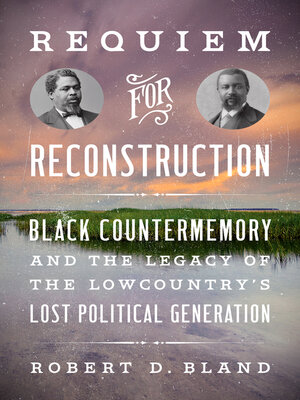Requiem for Reconstruction
ebook ∣ Black Countermemory and the Legacy of the Lowcountry's Lost Political Generation · The John Hope Franklin Series in African American History and Culture
By Robert D. Bland

Sign up to save your library
With an OverDrive account, you can save your favorite libraries for at-a-glance information about availability. Find out more about OverDrive accounts.
Find this title in Libby, the library reading app by OverDrive.



Search for a digital library with this title
Title found at these libraries:
| Library Name | Distance |
|---|---|
| Loading... |
The promise of Reconstruction sparked a transformative era in American history as free and newly emancipated Black Americans sought to redefine their place in a nation still grappling with the legacy of slavery. Often remembered as a period of failed progressive change that gave way to Jim Crow and second-class citizenship, Reconstruction’s tragic narrative has long overshadowed the resilience and agency of African Americans during this time.
Requiem for Reconstruction chronicles Reconstruction’s legacy by focusing on key Black figures such as South Carolina congressman Robert Smalls, Judge William Whipper, writer Frances Rollin, and others who shaped postbellum Black America. Robert D. Bland traces the impact of the Reconstruction generation—Black Americans born between 1840 and 1870 who saw Reconstruction as a defining political movement and worked to preserve its legacy by establishing a new set of historical practices such as formulating new archives, shaping local community counternarratives, using the Black press to inform national audiences about Southern Republican politics, and developing a framework to interpret the recent past’s connection to their present world. Set in South Carolina’s Lowcountry—a hub of Black freedom, landownership, and activism—this book shows how late nineteenth-century Black leaders, educators, and journalists built a powerful countermemory of Reconstruction, defying the dominant white narrative that sought to erase their contributions.
Requiem for Reconstruction chronicles Reconstruction’s legacy by focusing on key Black figures such as South Carolina congressman Robert Smalls, Judge William Whipper, writer Frances Rollin, and others who shaped postbellum Black America. Robert D. Bland traces the impact of the Reconstruction generation—Black Americans born between 1840 and 1870 who saw Reconstruction as a defining political movement and worked to preserve its legacy by establishing a new set of historical practices such as formulating new archives, shaping local community counternarratives, using the Black press to inform national audiences about Southern Republican politics, and developing a framework to interpret the recent past’s connection to their present world. Set in South Carolina’s Lowcountry—a hub of Black freedom, landownership, and activism—this book shows how late nineteenth-century Black leaders, educators, and journalists built a powerful countermemory of Reconstruction, defying the dominant white narrative that sought to erase their contributions.







